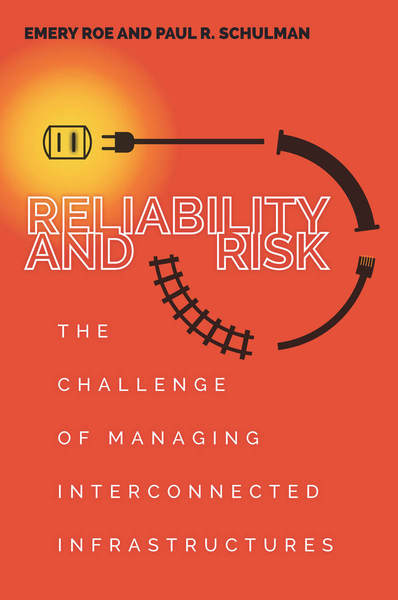
2016
264 pages.
$85.00
Hardcover ISBN: 9780804793933
Ebook ISBN: 9780804798624
The safe and continued functioning of critical infrastructures—such as electricity, natural gas, transportation, and water—is a social imperative. Yet the complex connections between these systems render them increasingly precarious. Furthermore, though we depend so heavily on interconnected infrastructures, we do not fully understand the risks involved in their failure.
Emery Roe and Paul R. Schulman argue that designs, policies, and laws often overlook the knowledge and experiences of those who manage these systems on the ground—reliability professionals who have vital insights that would be invaluable to planning. To combat this major blind spot, the athors construct a new theoretical perspective that reveals how to make sense of complex interconnected networks and improve reliability through management, regulation, and political leadership. To illustrate their approach in action, they present a multi-year case study of one of the world's most important "infrastructure crossroads," the San Francisco Bay-Delta. Reliability and Risk advances our understanding of what it takes to ensure the dependability of the intricate—and sometimes hazardous—systems on which we rely every day.
About the authors
Emery Roe is Senior Research Associate at University of California, Berkeley's Center for Catastrophic Risk Management.
Paul R. Schulman is Professor of Government at Mills College and a Senior Research Associate at University of California, Berkeley's Center for Catastrophic Risk Management.
"This brilliant and provocative analysis translates complex interorganizational dependencies into accessible images and manageable practices. Complexity on this scale has been largely neglected because it is so difficult to register. But that has not deterred Roe and Schulman. Their argument coheres and is strengthened by a consistent focus on managers who bring agency to technical and physical systems. This important book will have enduring impact at a time when reliability and resilience across vulnerable infrastructures is becoming a dominant issue."
—Karl E. Weick, co-author of Managing the Unexpected, Third Edition
"In this wonderful book, Roe and Schulman sound the alarm: the critical infrastructures on which society depends are at risk. System operators may no longer be able to keep these risks at bay. This book explains in clear prose what we need to understand to keep those critical systems working."
—Arjen Boin, Leiden University
"When critical infrastructures become operational, they come with a degree of risk. Interdependency was not an issue when most of the Delta infrastructure, described in this book, was first constructed. But, it has become a major challenge for the Bay Area. Reliability and Risk describes how highly trained professionals have dramatically improved our ability to manage in this new environment, drawing out lessons that will be indispensable for regions around the globe."
—Don Boland, California Utilities Emergency Association
"In this important book, Schulman and Roe take us on an eye-opening journey through the hidden difficulties of managing our critical infrastructures. By examining the realities faced by a range of professionals, these two leading thinkers develop a rich and innovative account of the nature of reliability and resilience. Reframing some of our most fundamental assumptions about risk and safety, this book will be of enormous use to practitioners, policymakers, and researchers who seek to understand complex systems."
—Carl Macrae, University of Oxford and author of Close Calls: Managing Risk and Resilience in Airline Flight Safety
"This book engages a critical domain with an unusually acute level of empirical and conceptual nuance. It significantly extends the discussion of reliability and risk assessment, issuing strong challenges to practitioners and offering pointed implications for operational and regulatory leaders. An important, demanding work."
—Todd R. LaPorte, University of California, Berkeley